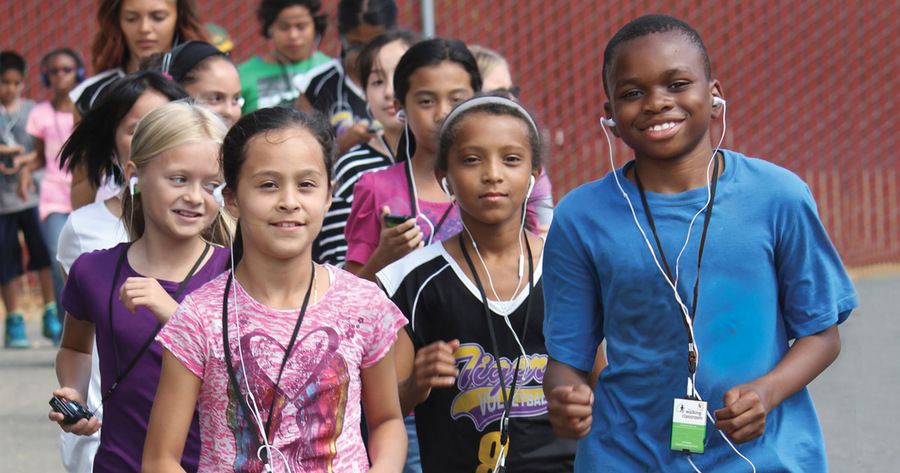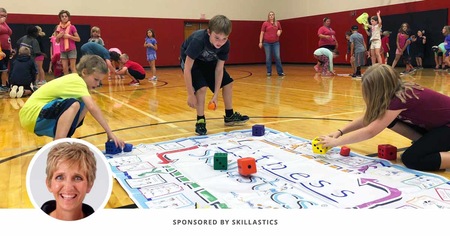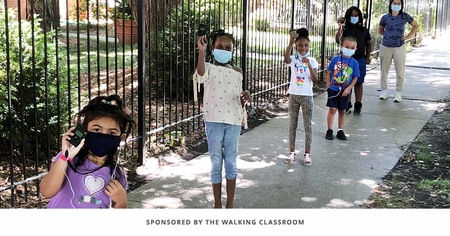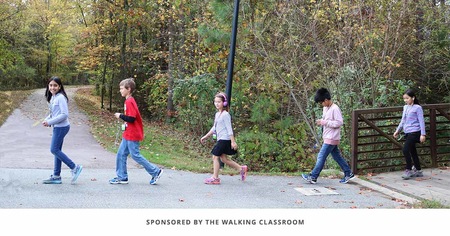There is also a strong connection between increased physical activity and improved brain function.
The Walking Classroom's "Walk, Listen, and Learn" methodology successfully combines listening with exercise to capitalize on these connections for stronger academic performance, for kids in grades 3 – 8.
And it's fun!
The award-winning nonprofit program has kids go for a brisk 20-minute walk while listening to custom-written, entertaining and educational podcasts about science, language arts and history. Afterward, available lesson plans help facilitators lead discussions to synthesize and solidify learning.
Bridging the Gap
Children who grow up in poverty often have the lowest academic achievement. By age 4, children from low-income families have heard 32 MILLION fewer words than their higher-income peers. This language deficit greatly affects their ability to learn to read, because they have no context for what many words mean.
Because children can listen and understand two to three grade levels higher than their reading level, The Walking Classroom can help them catch up with their classmates and enjoy success with grade-level activities. It's a bridge to academic content for students whose independent reading skills have not yet caught up with grade-level expectations. Having the ability to fully participate in class discussions following a walk allows kids with non-traditional learning styles the opportunity to feel smart.
A recent letter from an educator who uses The Walking Classroom:
"My students either have learning disabilities and/or dyslexia. Listening to grade level standards-based podcasts has opened a whole new world for them.
"Two of my students in particular struggle so much with reading. They are always so discouraged. But after every walk, they are the first to share a detail that they have heard. No reading required!
"[The Walking Classroom] has empowered them toward success. I am so grateful for the opportunity to unlock the world of knowledge for my students."
—Kim Davis, Grades 3 – 5 Special Day Class Teacher
Healthy Habits and Social-Emotional Learning
In addition to academic content, each Walking Classroom podcast begins with a different health message to help build a strong understanding of health concepts and promote healthy lifestyles. Kids learn about things like the difference between empty calories and healthy calories, or why it's important to stay hydrated.
Each Walking Classroom podcast also includes a character value that is woven throughout the narrative. Lesson plans provide guidance to help facilitators lead thoughtful discussions after walks.
Benefits for Everyone
The positive effects of exercise on academic achievement appear regardless of gender and socioeconomic differences, so all students can benefit from the program. This improved cognitive function can extend throughout the student's adult life.
All students benefit from the increased activity and educational content the program provides, but The Walking Classroom also provides an innovative tool to meet the needs of their students with alternative learning styles such as ADHD, dyslexia and/or autism.
"My students were able to talk about so much information they learned and remembered from the podcasts. It was amazing! This is truly a valuable resource for my second-language learners," said Petrecia Shales, an ESL teacher for fifth- and sixth-graders.
The program is helping bridge the achievement gap. It's teaching healthy lifestyles and the importance of exercise. Kids and educators in all types of learning environments love it!
Courtesy of The Walking Classroom. Learn more at www.TheWalkingClassroom.org.
Photo Courtesy of The Walking Classroom.




